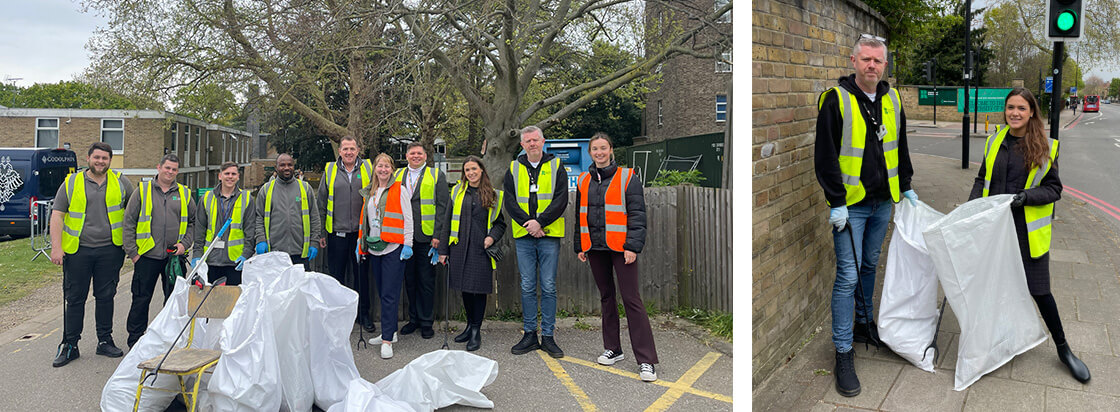Effective waste management is crucial to our sustainability efforts at Roehampton. The waste management landscape at the University includes a range of activities, including waste generation, internal transportation and storage, and collection for disposal. The Facilities Team and our Cleaning Contractor, Apleona, handle waste coordination as part of the Estates and Campus Services Division.
Around 85% of our waste falls into residual (general) waste or Dry Mixed Recycling (DMR), which includes commonly recyclable materials such as paper, card, aluminium cans, glass, and some plastics. In addition to these streams, some specialised waste is generated within specific schools and technical facilities. In such cases, the waste-producing faculties manage these streams independently through separate contracts, ensuring safe and compliant disposal.
Waste Management

Our waste contractor, Suez, manages the collection of all general waste (refuse) from our campus. Rather than being sent to landfill, all general waste is directed to energy recovery facilities where it is combusted to generate electricity and heat. This approach significantly reduces the greenhouse gas emissions associated with waste disposal and supports the transition to more sustainable waste management practices.
To put this into perspective, during the 2023/24 academic year, emissions from the disposal of our general waste totalled 2,377 kgCO2e. If all our general waste had been sent to landfill instead of being combusted for energy recovery, those emissions would have been 192,903 kgCO2e – over 80 times higher. This highlights the significant environmental benefits of diverting waste from landfill and choosing more sustainable disposal methods.

Our campus is equipped with clearly labelled bins for dry mixed recycling, making it easy for everyone to do their part for the environment. These bins are located in key areas across the campus and are designed to collect a wide range of recyclable materials, including:
- Paper and card
- Plastic bottles and containers
- Metal items e.g. Aluminium cans

In 2023, we introduced a biodigester on campus to transform food waste from our canteens into a valuable composting product. The compostable waste stream allows for the centralised disposal of food waste and catering disposables (e.g. Vegware packaging). By diverting food waste from general disposal to composting, the biodigester has reduced the amount of food waste going into residual waste, supporting campus-wide efforts to reduce waste.
Through research and evaluation of several options, we selected Harp Renewables' thermophilic aerobic digester machine. This technology converts 80% of compostable waste into compost in just 24 hours. It constantly regenerates microbes, neutralises ammonia to eliminate unpleasant odours, and heats to 70 ºC to reduce pathogens. Additionally, it prevents the oxidation of carbon into CO2, thereby minimising greenhouse gas and eliminating emissions from incurred from transporting food waste.
As a result, we are now able to produce nutrient-rich soil enhancer products. We are currently exploring options for selling or donating the product to local organisations or third parties to strengthen collaboration and build partnerships.
Signage is displayed across all campus catering outlets to raise awareness and encourage everyone in our community to dispose of compostable waste responsibly.
Learn more about our efforts to reduce food waste and our use of Too Good To Go at the University of Roehampton by visiting our Sustainable Food page.

At our university, we're committed to responsible waste management, including recycling used batteries. Thanks to our partnership with Valpak, we have battery collection boxes conveniently located in key areas such as the diners, library, and near photocopiers.
Valpak provides a free-of-charge service to collect and recycle the batteries once the boxes are full. Their process ensures the boxes are either reused or replaced if damaged, minimising waste. As a company with a strong focus on sustainability, Valpak helps divert hazardous materials from landfills and supports a circular economy by recovering valuable materials from used batteries.
By using Valpak, we contribute to their broader mission of reducing environmental impact, promoting zero waste to landfill, and maintaining compliance with UK recycling regulations. Help us by depositing your used batteries in the designated boxes on campus! For more information about Valpak's sustainability initiatives, visit their website.
We participate in the HP Planet Partners program, a global initiative that promotes the responsible recycling of HP Original Ink and Toner Cartridges. This program ensures cartridges are processed in a closed-loop recycling system, where materials are recovered and reused to create new products, including other HP cartridges.
Key highlights of the HP recycling program include:
- Free and convenient recycling of used HP cartridges.
- A process that keeps plastic out of oceans and landfills, contributing to a more sustainable future.
- Incorporation of recycled plastics into new HP cartridges, with up to 88% recycled content in Original HP Ink Cartridges and 100% in Toner Cartridges.
At our university, toner cartridges are collected at the Richardson building. Learn more about HP's sustainability efforts and their Planet Partners programme here.
Our catering partner Elior arranges for the collection of used cooking oil by Olleco, a company that processes it into high-quality biodiesel. This closed-loop recycling system significantly reduces carbon emissions and transforms used oil into sustainable fuel, providing an eco-friendly alternative to traditional biodiesel.
Each year, we partner with our cleaning contractor, Apleona, to host clean-up events in the areas surrounding our campus. These events bring staff and students together to tackle litter, improve the local environment, and strengthen community ties. Our most recent clean-up in April 2024 was a great success—read more about it in this blog post.

